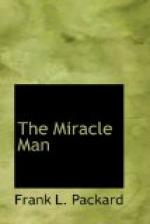Madison stirred now—stirred uneasily—while the silence held. There was a solemnity in the silence that seemed to creep upon and pervade the room—a sense of a vast something that was the antithesis of turmoil, passion, strife, that seemed to radiate from the saintly figure whose lips were mute, whose ears heard no sound, whose eyes saw no sight. And upon Madison it fell potent, masterful, and passion fled, and in its place came a strange, groping response within him, a revulsion, a penitence—and he bowed his head.
And then Helena spoke—but her head was turned away from him, hidden on the Patriarch’s breast.
“Once,” she said, and her words were like broken whispers, for she was sobbing still, “once, long, long ago, when I was a little girl, I read the story of Mary Magdalen. I had almost forgotten it, it was so long ago, but it has come back to me, and—and it is a glad story—at the end.”
She stopped—and Madison raised his head, and his face was strained as with some sudden wonder as he looked at her.
“It is a glad story,” she said presently. “It—it is my story.”
“You mean”—Madison’s voice was hoarse—“you mean that you’ve turned—straight!”
“They love me here,” she said. “They trust me and they think me good—as they are. All think me that—the little children and this dear man here—and for a little while, since I have been here, I have lived like that. They made me believe that it was true—true. And there was shame and agony—and hope. It seemed they could not all be wrong, and I have asked and prayed that I might make it true always—and—and forgiveness for what I was.”
“You mean,” he said again hoarsely, and he stepped toward her now, “you mean that you are—straight!”
She did not answer—only now she turned her face toward him and lifted up her head.
And for a long minute Madison gazed into the tear-splashed eyes, deep, brave in chastened wistfulness, gazed—and like a man stunned walked from the room, the cottage, and out across the lawn.
—XX—
TO THE VICTOR ARE THE SPOILS
Many were still about the lawn as he left the cottage—they were all about him, those sick, half frantic creatures—and still they made noises; still some of them cried and sobbed; still in their waning paroxysms they moved hither and thither. They appealed to some numbed, dormant sense in Madison, in a subconscious way, as things to be avoided. And so, almost mechanically, he took the little path that, striking off at right angles to the wagon track where it joined the Patriarch’s lawn, came out again upon the main road at the further end of the village.
And, as he walked, like tidal waves on-rushing, emotions, utterly at variance one with another, hurled themselves upon him, and he was swept from his mental balance, tossed here and there, rolled gasping, strangling in the chaos and turmoil of the waters, as it were, and, rising, was hurled back again.




